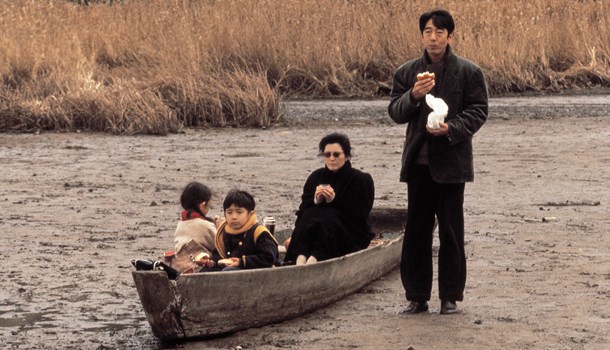
Written by Richard Durrance on 21 Feb 2024
Distributor Radiance • Certificate 12 • Price £17.99
At risk of sounding like a total neurotic, The Sting of Death is perhaps my perfect mental block of a film. The last Radiance film I reviewed, I, the Executioner knocked me down like the proverbial feather - surely the film they were also releasing the same month couldn’t really stand up to it, could it? So I put it off for a while. When I did finally pop the disc in, the first few moments of watching it caused a similar reaction to I, the Executioner. It just felt so right to my taste.
Having discovered her husband, Toshio (Ittoku Kishibe) has had an affair, Miho’s (Keiko Matsuzaka) mind starts to unravel, jealousy consuming her soul, while Toshio seeks to make amends and stop her from toppling into insanity.
Kohei Oguri’s 1990 film immediately struck me, it’s formalised, precise imagery and performances were compelling from the first second. To some I suspect it will feel pretentious, potentially too slow and dull to bother with, but those switching off will eventually find that they have missed out on a remarkable work of art. And that's the thing, The Sting of Death feels like a work of art; its images are often quite beautiful and there is a regular sense of them coming straight out of a painting; and, like I, the Executioner there’s something in the tone and the pacing of the film that keeps you engrossed throughout. For a film that nearly hits the two-hour mark, it could easily have lost focus, become wearisome but instead, as we follow Toshio and his wife, as her mind starts to crumble under the assault of her husband’s prior philandering and imaginary potential infidelities, Oguri creates a stunningly compulsive film.
Arguably, not much happens, but what does is remarkable. Explaining it is difficult, because it’s a film you suspect you need to really experience to fully appreciate its impact. Much of how it’s performed and shot has a beautiful artifice to it, and strangely that artificiality makes everything seem more real. As Miho surprises her husband outside where he works and berates him for going in the wrong direction, only for him to explain why he was crossing the road as he was and how every day in the future he will walk one way, just this way, so that Miho always knows where he’ll be going, may seems ludicrous, but in the context of the film makes utter emotional sense. There is an apparent distance too enforced by the director, as much of the film takes place in medium shots, formalised but not in a way that seems dull or disinterested, instead it gives space for our two leads, and sometimes their two children, to breathe, to exist, to move, to engage and interact. The way Oguri is willing to carefully frame a scene allows them to unfold in a way that can be more forceful than the use of moving cameras or close-ups. After all what we see on screen as Miho descends into jealous madness, and her husband’s struggle to placate her is powerful, even if often underplayed. True, there are scenes that are more manic, but the sense of emotion dwelling under the surface of both characters is utterly palpable.
As we watch the ever more disturbing interplay between Miho and Toshio, we also find ourselves questioning how they came to this. Has Miho’s mental state always been like this and in doing so without meaning pushing her husband away with unfounded jealousy? Or was his affair nothing to do with his wife? That we cannot answer such questions, though the novel upon which the film is based may explain it, the ambiguity makes the film more powerful because as Miho becomes more and more erratic, less coherent, sensible and prone to hysteria, Toshio’s adherence to her seems at times itself close to madness, and one scene certainly both of their emotional states careen into an almost orgastic self-destruction, thankfully averted.
Another aspect I found intriguing was how the story - though taking place after the second world war - has an odd timelessness to it. We could be living in almost any period (excepting the obvious trappings), and so the emotional impact never feels like it belongs to a place, a time or a situation, instead what transpires becomes timeless, and could easily be filmed again, situated today and lose none of its impact.
That said it would need some remarkable performances to top Keiko Matsuzaka as Miho, and Ittoku Kishibe as Toshio. Their performances, rarely showy, often deeply underplayed, their emotions so deeply felt and is frequently as hypnotic as the direction, as they seem to emotionally collapse in on each other. There's nothing flashy here and is so, so much more powerful for it.
Kohei Oguri has only made six films and this is I believe my first viewing of his works. It’s a remarkable work of art, brilliantly performed, tense, emotive and while maybe not for everyone, essential for anyone who loves cinema The Sting of Death is an absolute must.

Long-time anime dilettante and general lover of cinema. Obsessive re-watcher of 'stuff'. Has issues with dubs. Will go off on tangents about other things that no one else cares about but is sadly passionate about. (Also, parentheses come as standard.) Looks curiously like Jo Shishido, hamster cheeks and all.
posted by Richard Durrance on 17 Dec 2025
posted by Richard Durrance on 12 Dec 2025
posted by Ross Locksley on 09 Dec 2025
posted by Richard Durrance on 28 Nov 2025
posted by Richard Durrance on 25 Nov 2025
posted by Richard Durrance on 18 Nov 2025
posted by Richard Durrance on 14 Nov 2025
posted by Richard Durrance on 11 Nov 2025